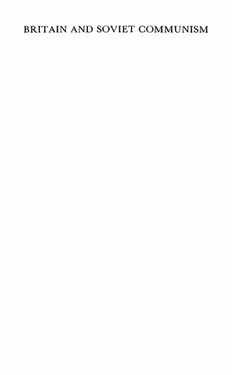
Britain and Soviet Communism PDF
Preview Britain and Soviet Communism
BRITAIN AND SOVIET COMMUNISM B rita in a n d Soviet C o m m u n is m The Impact of a Revolution F. S. NORTHEDGE and AUDREY WELLS M © F. S. Northedge and Audrey Wells 1982 All rights reserved. No part of this publication may be reproduced or transmitted, in any form or by any means, without permission. First published 1982 by THE MACMILLAN PRESS LTD London and Basingstoke Companies and representatives throughout the world ISBN 0 333 27192 0 (he) ISBN 0 333 27193 9 (pbk) Filmset in 10/12pt Baskerville by Reproduction Drawings Ltd., Sutton, Surrey Printed in Hong Kong The paperback edition of this book is sold subject to the condition that it shall not, by way of trade or otherwise, be lent, resold, hired out, or otherwise circulated without the publisher’s prior consent, in any form of binding or cover other than that in which it is published and without a similar condition including this condition being imposed on the subsequent purchaser. Contents Preface vii PART I: NEITHER ENEMIES NOR FRIENDS 1 Contact and Conflict 3 2 Living with a Revolution 25 3 Our Fatal Choices 49 4 The Wartime Alliance 76 5 Cold War and Detente 103 PART II: THE CULTURAL AND ECONOMIC ASPECTS 6 Russophobia and Russophilia 137 7 Russia and the Intellectuals 158 8 The Impact on the Left 181 9 Economic Relations 210 10 Summing Up 234 Source Material 249 Notes 255 Index 266 Preface subjects which deeply affect our lives have had so little written Few about them as relations between Britain and the Soviet Union. Britain and Russia have been in diplomatic contact for over four hundred years, and each country has probably played a more sustained role in the other’s international affairs over a long period than any other country. Since the revolution in Russia in 1917, the issues raised by Soviet communism have provoked as intense a debate in Britain as any in our history. It is also all too obvious today that our relations with the Soviet state, along with those of our allies, could go far to determine, not only the future of the human race, but whether there will be a future at all. And yet serious studies of Anglo- Soviet affairs are few. One reason for this, of course, is the paucity of information available to Western scholars about the making of the external policy of the Soviet Union, and this was true to a large extent of Russian policy in Tsarist times, too. Moreover, the virtual absence of free contacts between the Soviet people and the world outside makes it difficult, if not impossible, for the non-Russian to assess what kind of impact the British have made on the Russians. We have therefore concentrated in this book, not on the two sides of the coin of Anglo- Soviet relations, as one might expect in a study of any other pair of countries, but on the British experience of the Soviet phenomenon since the revolution. We are concerned with what Britain has made of this great and strange force in world politics, Soviet communism, and how it has affected our life and thought. The book is accordingly divided into two parts. Part I is devoted to the main themes in Britain’s experience of the Soviet Union in war and peace during the past sixty-three years. Its object is to provide a broad account of what the Soviet state has meant for Britain in world political terms since 1917, and at the same time it formulates a judgement, or series of judgements, on how well British politicians and the British community as a whole have coped with this portent on the world scene. The story is presented in enough detail, it is hoped, to counteract partisan generalities which so often pass for considered opinions on British relations with Russia, while not losing sight of the PREFACE vin main thread of events. In part II the impact of the revolution and its sequel in Russia on British affairs and thinking is considered in a somewhat broader sense, with attention paid to the extraordinary polarities of British reactions to things Russian, the switches from love to hate; to the profound effects of Soviet communism on the intellectual and academic community in Britain, both in the past and more recently; to the role played by the Soviet Union in the Labour and trade union movements in this country; and to the importance of the Soviet system at different times to the British economy, trade and employment. Our principal argument is that the problem of how Britain is best to deal with the Soviet Union demands the most detached study of which we are capable, both because of the momentousness of the issues which now divide East and West, and because of the intense feelings in which so much of our thinking about Russia has been and continues to be steeped. British views about Russia have almost always violently oscillated from one extreme of emotion to another, owing partly to our ignorance of the other country (to which the Russians themselves, or their leaders, have systematically contributed), partly to the range and seriousness of the issues which the Soviet phenomenon has raised for us, and partly to the fact that our attitudes to Soviet communism are more often than not governed by our thoughts and feelings about things to which Soviet communism may be quite unrelated. This book is conceived as a modest contribution to the formation of more rational judgements. The London School of Economics and F. S. Northedge Political Science Audrey Wells May 1981 Part I Neither Enemies nor Friends
